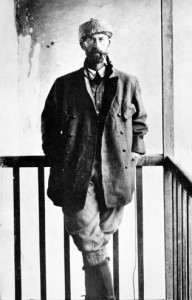Percy Harrison Fawcett
Morrison, Tony
Tony Morrison is probably best known for his definitive work on the Nazca Lines, Pathways to the Gods[1036]. Tony and Marion Morrison have developed the South American Pictures.com website in order to show their extensive life-work. Unfortunately, the southamericanpictures website went offline but now, many of the image collections have been reassembled and are again available online(b).
In 1998 Morrison published a number of papers provocatively entitled The Bolivian Atlantis(b-e). They cover familiar territory – Tiwanaku, Pumapunku, Posnansky, Bellamy, Fawcett, Sykes, Blashford-Snell. This was the same year that Jim Allen published his Atlantis: The Andes Solution[877]. Had Allen not done so, I suspect that Morrison might have produced a more detailed book himself as apparently he and a colleague, Mark Howell, had built up quite a dossier on the subject.
Surprisingly, Morrison did not mention the mysterious puquios of the Nazca region(f), which, with the aid of satellite imagery(g), have been shown to have been part of a sophisticated hydraulic system that supplied water to an extremely arid locality.
*(a) https://nonesuchexpeditions.com/south-american-pictures/sap-archaeology-history-index.htm*
(b) https://www.nonesuchexpeditions.com/South-American-Pictures/sap-archaeology-history-index.htm
(f) https://www.flickriver.com/photos/tags/puquios/interesting/
(g) https://www.bbc.com/future/story/20160408-the-ancient-peruvian-mystery-solved-from-space
Fawcett, Percy Harrison
Colonel Percy Harrison Fawcett (1867-1925?) was a retired military engineer with a great interest in archaeology. Fawcett, who published a number of articles in The Occult Review, believed in the existence of Atlantis and was convinced that he could find a remnant of its advanced population(c). Inspired by stories of lost cities in the Amazonian jungle he was convinced that Brazil had been the home to a city that had been a colony of Atlantis. His ambition was to discover the location of this city, which he referred to as ‘Z’, and so prove the reality of Atlantis.
stories of lost cities in the Amazonian jungle he was convinced that Brazil had been the home to a city that had been a colony of Atlantis. His ambition was to discover the location of this city, which he referred to as ‘Z’, and so prove the reality of Atlantis.
>An article(e) by Francisco Lago on The Great Web of Percy Harrison Fawcett has claimed that in fact what Fawcett was seeking in Brazil was a city founded by Greeks! He adds that “the search for Atlantis was just a plausible publicity way to collect funds”!<
Alan Baker recounts[1031.121] how in 1924 Fawcett wrote to Lewis Spence outlining his theory that this lost city had been home to white-skinned refugees from Atlantis. Undaunted by an earlier failed expedition, in 1925 he led a second attempt, partly sponsored by the Royal Geographical Society, into the Matto Grosso and disappeared without trace(a). A book by David Grann, The Lost City of Z, was published[772] in 2009. There is a film produced by and starring Brad Pitt as Fawcett and his search for Z on release now (2017) and also entitled The City of Z.
The Russian researcher, Oleg Dyakonov, has written an extensive paper(d) on Fawcett, his expeditions, achievements and his critics. It is in Portuguese, but translates well with Google.
(a) The Great Unknown, The Great Explorers (archive.org)
(b) https://www.guardian.co.uk/world/2010/jan/05/amazon-dorado-satellite-discovery
(c) https://archive.archaeology.org/online/features/hoaxes/fawcett_idol.html
